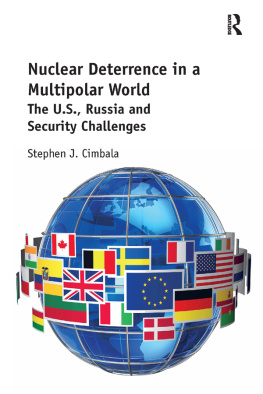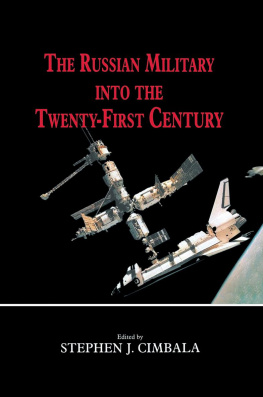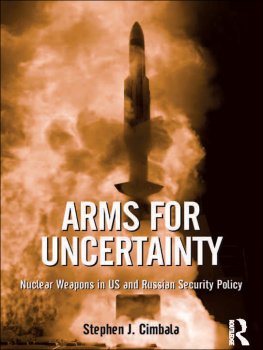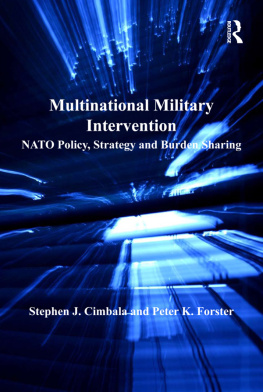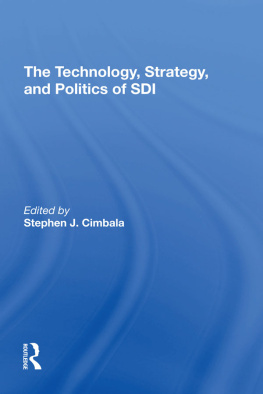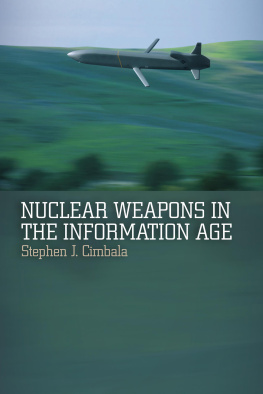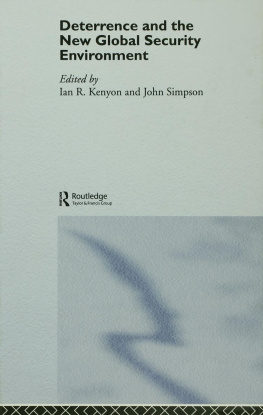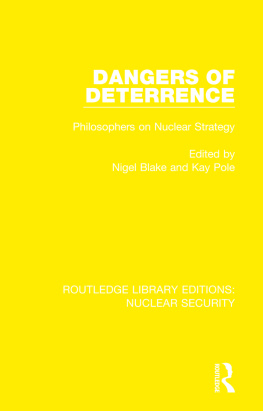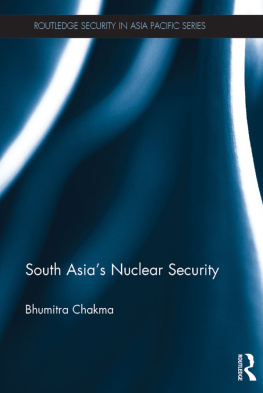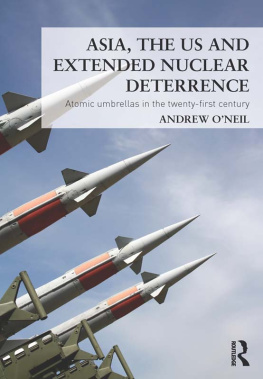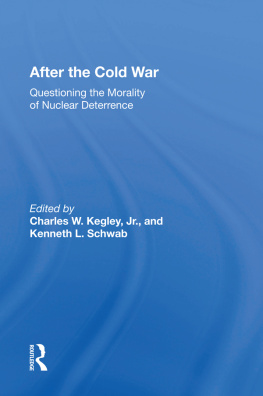Stephen J. Cimbala - Nuclear Deterrence in a Multipolar World: The U.S., Russia and Security Challenges
Here you can read online Stephen J. Cimbala - Nuclear Deterrence in a Multipolar World: The U.S., Russia and Security Challenges full text of the book (entire story) in english for free. Download pdf and epub, get meaning, cover and reviews about this ebook. year: 2017, publisher: Routledge, genre: Politics. Description of the work, (preface) as well as reviews are available. Best literature library LitArk.com created for fans of good reading and offers a wide selection of genres:
Romance novel
Science fiction
Adventure
Detective
Science
History
Home and family
Prose
Art
Politics
Computer
Non-fiction
Religion
Business
Children
Humor
Choose a favorite category and find really read worthwhile books. Enjoy immersion in the world of imagination, feel the emotions of the characters or learn something new for yourself, make an fascinating discovery.
- Book:Nuclear Deterrence in a Multipolar World: The U.S., Russia and Security Challenges
- Author:
- Publisher:Routledge
- Genre:
- Year:2017
- Rating:5 / 5
- Favourites:Add to favourites
- Your mark:
- 100
- 1
- 2
- 3
- 4
- 5
Nuclear Deterrence in a Multipolar World: The U.S., Russia and Security Challenges: summary, description and annotation
We offer to read an annotation, description, summary or preface (depends on what the author of the book "Nuclear Deterrence in a Multipolar World: The U.S., Russia and Security Challenges" wrote himself). If you haven't found the necessary information about the book — write in the comments, we will try to find it.
Stephen J. Cimbala: author's other books
Who wrote Nuclear Deterrence in a Multipolar World: The U.S., Russia and Security Challenges? Find out the surname, the name of the author of the book and a list of all author's works by series.
Nuclear Deterrence in a Multipolar World: The U.S., Russia and Security Challenges — read online for free the complete book (whole text) full work
Below is the text of the book, divided by pages. System saving the place of the last page read, allows you to conveniently read the book "Nuclear Deterrence in a Multipolar World: The U.S., Russia and Security Challenges" online for free, without having to search again every time where you left off. Put a bookmark, and you can go to the page where you finished reading at any time.
Font size:
Interval:
Bookmark:
A MULTIPOLAR WORLD
Multipolar World
Penn State Brandywine, USA

2 Park Square, Milton Park, Abingdon, Oxon OX14 4RN
711 Third Avenue, New York, NY 10017, USA
Product or corporate names may be trademarks or registered trademarks, and are used only for identification and explanation without intent to infringe.
A catalogue record for this book is available from the British Library
Names: Cimbala, Stephen J., author.
Title: Nuclear deterrence in a multipolar world : the U.S., Russia and
security challenges / by Stephen J. Cimbala.
Description: Farnham, Surrey, UK ; Burlington, VT : Ashgate, 2016. | Includes
bibliographical references and index.
Identifiers: LCCN 2015035610| ISBN 9781472480910 (hardback) |
Subjects: LCSH: Nuclear arms control--International cooperation. | Nuclear
nonproliferation--International cooperation. | Nuclear weapons--Government
policy--United States. | Nuclear weapons--Government policy--Russia
(Federation) | United States--Foreign relations--Russia (Federation) |
Russia (Federation)--Foreign relations--United States.
Classification: LCC JZ5665 .C559 2016 | DDC 355.02/17--dc23 LC record available at
http://lccn.loc.gov/2015035610
Font size:
Interval:
Bookmark:
Similar books «Nuclear Deterrence in a Multipolar World: The U.S., Russia and Security Challenges»
Look at similar books to Nuclear Deterrence in a Multipolar World: The U.S., Russia and Security Challenges. We have selected literature similar in name and meaning in the hope of providing readers with more options to find new, interesting, not yet read works.
Discussion, reviews of the book Nuclear Deterrence in a Multipolar World: The U.S., Russia and Security Challenges and just readers' own opinions. Leave your comments, write what you think about the work, its meaning or the main characters. Specify what exactly you liked and what you didn't like, and why you think so.

